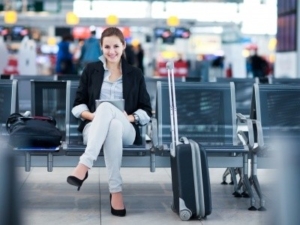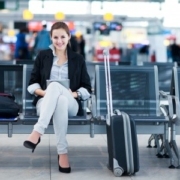Business Travel Hacks: Europe
 You’ve likely taken an international business trip or two where you wished you’d been more prepared; whether it be learning about that new travel app, electronic item, or the insider scoop on the best modes of local transportation. Below are a few suggestions to keep in mind for your next professional venture to the United Kingdom and/or the European continent.
You’ve likely taken an international business trip or two where you wished you’d been more prepared; whether it be learning about that new travel app, electronic item, or the insider scoop on the best modes of local transportation. Below are a few suggestions to keep in mind for your next professional venture to the United Kingdom and/or the European continent.
Travel Preparation
Make sure you have the following items in your luggage: European travel adaptor, dual voltage hair dryer, and travel iron. The UK and Ireland has different voltage to the rest of continental Euorpe. Toiletry items generally need to be stored in less than 100ml containers to take them in hand luggage on the flight.
When it comes to communication, a lot of travelers aren’t aware that they can stay connected to their U.S. mobile phone without paying international penalty fees. Google Voice has a ‘Hangouts’ app that requires an unlocked phone and a prepaid SIM card. You can pay as little as $13 a week for unlimited calls and limited data, and some SIM cards are available for $30 a month or under.
The hardest thing about going this route is unlocking your phone, since most smartphones are locked when you purchase them. There are a few easy ways around this.T-Mobile offers a free unlock code within 40 days of being a customer, and AT&T will do the same after 60 days, up to five times a year. You also have the option of paying a one-time fee through a third-party service which usually runs around $20.
Luckily, we live in the age of the smartphone, which allows you to pack much lighter with apps that help you with casual translations, exchange rates, jet lag, packing and organizing your trip schedule and more.
Out of many free and useful smartphone apps, there are a couple in particular that may help you while in Europe. iStone can swiftly help you in a translation debacle. It records and translates into 12 languages and carries more than 300 useful phrases in its data arsenal. It also features a native pronunciation feature. Better yet, it doesn’t require Wi-Fi. Worldmate is also handy for business travelers, combining all your travel booking info (flights, hotels, cars, etc.) to create both business travel and meeting agenda itineraries. The app also aggregates smartphone features such as world clocks, maps, weather info, and both Outlook and LinkedIn options so your itinerary can be shared among colleagues and peers.
Finally, make sure you are aware of the UK’s emergency number (999) and keep in mind that the current exchange rates change everyday.
“pharmacists are more useful as a contact point for a person whose health is in question in Europe than they are allowed by law to be in the US.”
Customs and Transportation
The European Union is vastly diverse, and even if a country uses English as its official, or secondary language, common customs in Sweden and Portugal may be surprisingly adverse to each other. Here a few European customs to be aware of and avoid:
Free drink ‘refills’ are not customary in Europe. Tipping isn’t a necessity, though if the service went above and beyond, a small tip is customary. 18-20% is definitely an American custom. Keep in mind that if you are driving after consuming alcohol, the blood alcohol levels vary by country, so you may want to review them.
About Travel notes that “pharmacists are more useful as a contact point for a person whose health is in question in Europe than they are allowed by law to be in the US.” If you happen to be closer to a pharmacy than a hospital, you may find the services you need there.
You can check out an array of country specific local customs on Virtual Tourist. The site includes comments from travelers who post things like customary greeting advice. For example, “The Austrian’s don’t greet each other like Germans with “Guten Tag”, instead you will hear a hearty “Grüß Gott!” (it means “Greet God”)” when entering a premises.
When it comes to making dining reservations, Forbes veteran travel journalist Larry Olmstead recommends using your hotel concierge. It is easier to get into the top restaurants this way, as well as saves you the hassle of trying to book online on a website in a foreign language. “Even if you can do it yourself, he writes, “the concierge at a top hotel like the Four Seasons or Peninsula has more clout and is likely to get a better table and the time you want.” He also mentions that it is important to tip the concierge, even if tipping in restaurants isn’t customary.
by Gina Scanlon










